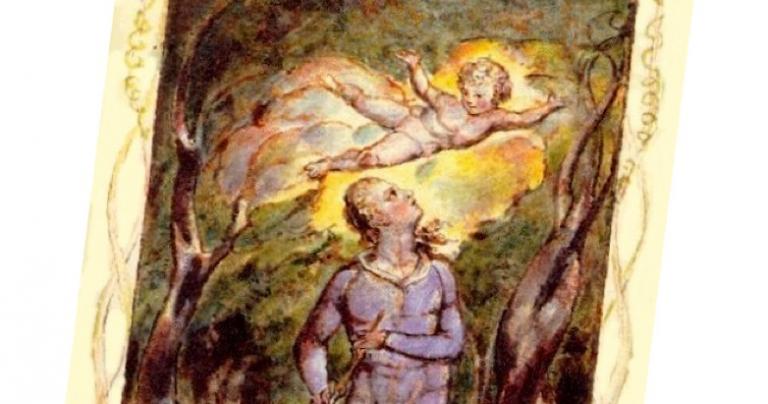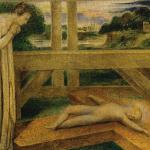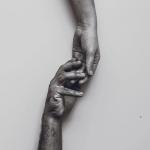 William Blake, half-mad wholly prophetic, lived in one of the first eras in human history when power was not just in the hands of a tiny ruling class. Shakespeare was at the start of the process that ended the (relative) powerlessness of the middle class, Shakespeare’s pen gave him power. Blake saw some bad fruit of middle class power moves: dark Satanic mills.
William Blake, half-mad wholly prophetic, lived in one of the first eras in human history when power was not just in the hands of a tiny ruling class. Shakespeare was at the start of the process that ended the (relative) powerlessness of the middle class, Shakespeare’s pen gave him power. Blake saw some bad fruit of middle class power moves: dark Satanic mills.
Shakespeare warned his audience, historically used to the innocence of relative powerlessness, that the urban was much less jolly with more responsibility than living in Arden. (See As You Like It.)
Shakespeare has King Henry IV say: “uneasy lies the head that wears the crown.” The King has power and so responsibility and all the blame for what goes wrong. Having power is attractive, but power in our broken world is the end of innocence. Only the Lord Jesus has ever had power and used it perfectly and humankind killed Him.
Christians should never feel easy with power or in the exercise of power. (God forgive me.) We might seek power to serve, but this must always come with hesitation. Who thinks themselves fit to be King? The old Christian tradition of looking for the person not eager to rule and giving that person power is sound. Often this was a hypocritical dance, not coming to the Convention where one was nominated for President often was a ruse, but this dance was good for a candidate. Americans did not trust people greedy for power, because that showed a disregard for the costs of power.
Nobody with power can avoid mistakes and the more power a person has the greater the chance of error. Imagine the power of the King in war and peace! Even in the smaller, less destructive wars of older times, the King had to choose and that was an end to a kind of innocence.
Henry V (in Shakespeare) faced this responsibility before Agincourt. He is in agony. Has he made wrong choices? If so, and given what Shakespeare has written, mistakes have been made. As King Henry cannot use the passive voice like a modern politician. If mistakes were made, they were King Henry’s. He made mistakes and they may lead to the destruction of the English army. It’s worth reading the entire complaint:
Upon the king! let us our lives, our souls, Our debts, our careful wives,Our children and our sins lay on the king! We must bear all. O hard condition, Twin-born with greatness, subject to the breath Of every fool, whose sense no more can feel But his own wringing! What infinite heart’s-ease Must kings neglect, that private men enjoy! And what have kings, that privates have not too, Save ceremony, save general ceremony? And what art thou, thou idle ceremony? What kind of god art thou, that suffer’st more Of mortal griefs than do thy worshippers? What are thy rents? what are thy comings in? O ceremony, show me but thy worth! What is thy soul of adoration? Art thou aught else but place, degree and form, Creating awe and fear in other men? Wherein thou art less happy being fear’d Than they in fearing. What drink’st thou oft, instead of homage sweet, But poison’d flattery? O, be sick, great greatness, And bid thy ceremony give thee cure! Think’st thou the fiery fever will go out With titles blown from adulation? Will it give place to flexure and low bending? Canst thou, when thou command’st the beggar’s knee, Command the health of it? No, thou proud dream, That play’st so subtly with a king’s repose; I am a king that find thee, and I know Tis not the balm, the sceptre and the ball, The sword, the mace, the crown imperial, The intertissued robe of gold and pearl, The farced title running ‘fore the king, The throne he sits on, nor the tide of pomp That beats upon the high shore of this world, No, not all these, thrice-gorgeous ceremony,Not all these, laid in bed majestical, Can sleep so soundly as the wretched slave, Who with a body fill’d and vacant mind Gets him to rest, cramm’d with distressful bread; Never sees horrid night, the child of hell, But, like a lackey, from the rise to set Sweats in the eye of Phoebus and all night Sleeps in Elysium; next day after dawn,Doth rise and help Hyperion to his horse,And follows so the ever-running year,With profitable labour, to his grave:And, but for ceremony, such a wretch,Winding up days with toil and nights with sleep, Had the fore-hand and vantage of a king. The slave, a member of the country’s peace, Enjoys it; but in gross brain little wots What watch the king keeps to maintain the peace, Whose hours the peasant best advantages.
To a modern this sounds like mere whining: Henry is King and isn’t it good to be King? It is good to be King, perhaps, but also responsible. Henry may or may not be a good king, but is decent enough to know the wretchedness that comes from ruling for a Christian.
No leader can give the stirring speech on Saint Crispin’s Day that Henry gave, if he has not agonized for his folks the night before the battle. The Christian leader has King Jesus as His model: emptying self, serving, dying if needs must for His friends.
That’s the lesson told that William Blake felt in his soul: the tension between the innocence we should maintain and the life we live. He speaks of innocence:
Songs of Innocence- Introduction
Piping down the valleys wild
Piping songs of pleasant glee
On a cloud I saw a child.
And he laughing said to me.
Pipe a song about a Lamb;
So I piped with merry chear,
Piper pipe that song again –
So I piped, he wept to hear.
Drop thy pipe thy happy pipe 10
Sing thy songs of happy chear,
So I sung the same again
While he wept with joy to hear
Piper sit thee down and write
In a book that all may read –
So he vanish’d from my sight.
And I pluck’d a hollow reed.
And I made a rural pen,
And I stain’d the water clear,
And I wrote my happy songs
Every child may joy to hear
Blake sees the simple life has a good to it, because the pleasures are natural and leave not litter. Childhood, which has little power, is on a cloud, a sort of Paradise. The songs sung are simple and the impact joyful. Tears leave no bitterness, though there is a hint of a fall. The ink needed to write a book stains the water, though the wording leaves ambiguity. Does the ink stain the water as we expect black ink to do or does this ink “stain the water clear?” Can we in innocence make a civilization without polluting the world?
The rural pen made of reed came from nature and to nature will return. The plastic pen is a problem, though, plastic is essential to medicine.
We grow up, we make mistakes we do not even understand when we make them, and experience puts lines on our faces. The simple songs no longer expess our experience and so we must call on the Bard, someone with the vision of Shakespeare.
We are designed for childhood’s end and to grow into mature adulthood. In a perfect world, power would be pure and we would use it wisely. . . Always. The Bard knows that even Henry cannot do so, but also that we need Henry.
Songs of Experience- Introduction
Hear the voice of the Bard!
Who Present, Past, & Future sees
Whose ears have heard, The Holy Word,
That walk’d among the ancient trees.
Calling the lapsed Soul
And weeping in the evening dew:
That might controll, The starry pole;
And fallen fallen light renew!
O Earth O Earth return!
Arise from out the dewy grass;
Night is worn, And the morn
Rises from the slumberous mass.
Turn away no more:
Why wilt thou turn away
The starry floor The watry shore
Is giv’n thee till the break of day.
The good news is that despite where we have gone wrong Nature remains. The stars endure and nothing humankind can do will touch them or can reach most of the cosmos. The Earth may be tortured, but it will endure. The prophet (Blake as England’s Jeremiah) bids us return. We have power and power has betrayed us at times, yet it also is necessary to us. Blake understood that we are in a city, not a countryside with clouds and lambs. Going back to the nursery is impossible and we would be wrong to try.
Instead, we can serve and be humble as we can be. Act. Do. Create beauty in the City, even a city like Houston where flawed men created some ugliness, but also great beauty and sparkling civilization. We have complex songs, Bach and blue grass. The night is around us, but worn. We cannot rise from slumber where cowards would stay and live, doing the best we can by God’s grace.
We cannot return to Eden, but we can go forward to the City of God.

















